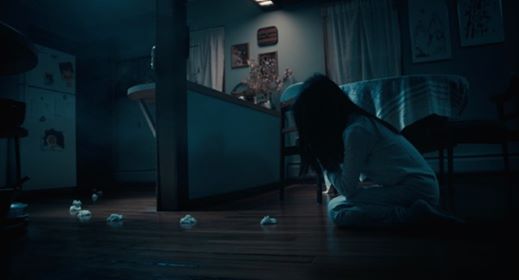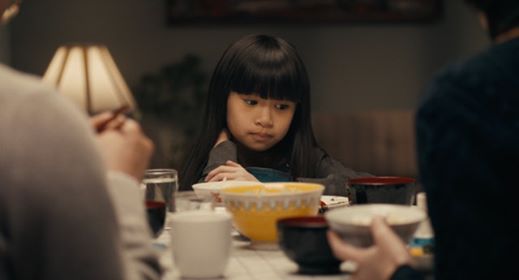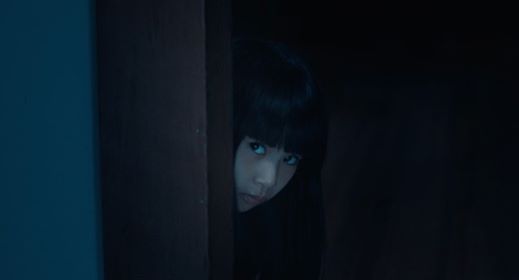With Stranger Things, Tigers Are Not Afraid, (read our reviews here and here) and It (read our reviews here and here), people are rediscovering the terrifying magic of being a child. More than being vulnerable, the willingness in children to believe in the fantastical creates a grounded atmosphere for nightmares to leap out of the mind and into the real world. Taking full advantage of this wonder are Writer/Directors Sumire Takamatsu and Jorge Lucas with their charming, family ghost story, Bakemono. Another entry in the 2019 Brooklyn Horror Film Festival’s Home Invasion Block of shorts, Bakemono tells the story of a family observing Setsubun, a Japanese tradition that takes place on the day before the start of spring in which evil spirits are cast out from the house with soybeans thrown from the doorway.
The tensions of a modern bilingual household come to a boil as the willful young daughter, Ayumi (Claudia Fabella), refuses to eat her food. Her mother, Oka-san (Shio Muramatsu) warns her that her uneaten dinner will summon the Bakemono, a sinister hunger spirit created when cruel parents sent their children to bed hungry. The threat fails, however, when Ayumi decides to be nice to the Bakemono and offer it her leftovers, hoping to win the demon over and make a friend. She doesn’t throw her beans and leaves the door open for the demon to come through.

The ten-minute short is the perfect length for each of the family members, Ayumi, Oka-san, and father Oto-san (Daisuke Suzuki), to introduce themselves and their dynamic to us. They feel like a real family, made all the more relatable by their quick transitions between Japanese and English at the dinner table. The family and their home feel lived in, and the frustrating conversation between parent and child about not wasting food feels as familiar as any we’ve had with our parents.

But the film really kicks into high gear when the Bakemono appears. Takamatsu and Lucas create a completely new tone in their film when Ayumi sneaks out of her room to give her food to the demon. She creates a trail of her leftovers and pleads with the Bakemono when it appears, grunting a single Japanese word: more. We feel the creature’s sympathetic emptiness and the terror of its menace simultaneously. We understand, like Ayumi, that she was right to pity this creature, but wrong to come to its aid.
The film’s cinematography from Rob Silcox creates a moody, blue atmosphere, the air as still and suffocating as calm water in these moments. The music from Emi Nishida reinforces this atmosphere and expertly creates pockets of unspeakable dread in the film’s sensitive moodscape of childlike wonder. Moreover, any short named after its monster sets a dreadfully difficult standard for itself. However, this Bakemono does not disappoint. The creature FX, provided by Krystle Feher, create a terrifying, memorable creature that stays behind your eyelids long after the credits.
Takamatsu and Lucas end their short in an unexpected way, leaving the same acidic scars as any classic of the form. These are smart, slick filmmakers with a lot to sayand the craft to say it all with impact. In researching this review, Takamatsu and Lucas assured me that Bakemono is the tip of their iceberg as they work on adapting the short into a feature while they continue to take the film to more festivals. For those with an appetite for spooky Japanese folklore and a well-paced story with a cute kid and a hideous monster, Bakemono is a hungry ghost worth the nightmares.
 PopHorror Let's Get Scared
PopHorror Let's Get Scared




